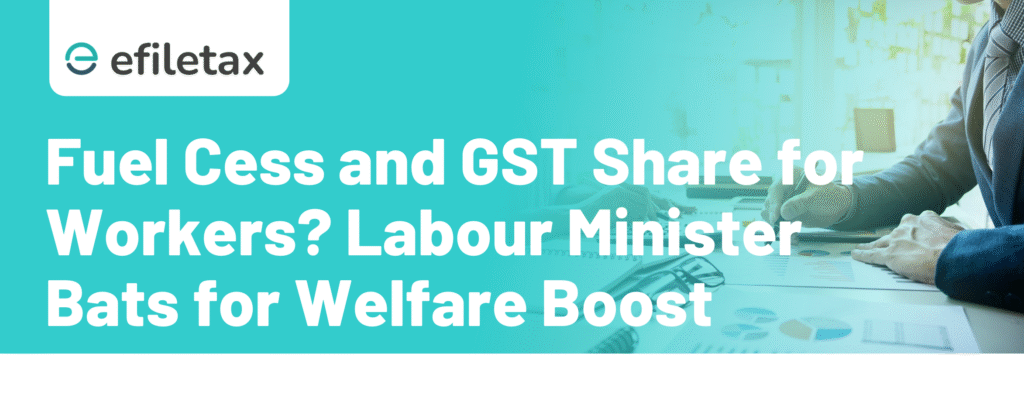
Fuel Cess and GST Share for Unorganised Workers: What It Means
In a major policy suggestion, Karnataka Labour Minister Santosh Lad has urged the Centre to allocate a portion of fuel cess and GST revenues toward welfare schemes for unorganised sector workers. With over 90% of India’s workforce in this category, this proposal could significantly enhance social security.
Let’s break down what this proposal means for the Indian taxpayer, state and central governments, and workers in the informal economy.
Why Focus on the Unorganised Sector?
According to Periodic Labour Force Survey (PLFS) and NITI Aayog data, more than 90% of India’s workers are employed in the informal economy — daily wage labourers, gig workers, street vendors, construction workers, domestic help, and small traders.
Challenges faced by unorganised workers:
- No formal job contracts or benefits
- Limited access to health insurance, pension, or maternity benefits
- Vulnerable to job loss, inflation, and health crises
- Low awareness and coverage under schemes like e-Shram
What is Being Proposed?
Labour Minister Santosh Lad has made two major proposals to the Union Government:
1. Fuel Cess Allocation
- Pension for gig workers
- Health cover for daily wage earners
- Education support for children of informal workers
2. Dedicated GST Share
- Building a permanent welfare corpus
- Funding E-Shram-linked schemes
- Regional-level social security boards and implementation
Is This Legally Feasible?
Let’s look at the legal and financial angles:
Constitutional Backing:
- Article 41 (Directive Principles) mandates the State to provide public assistance in cases of unemployment, old age, or sickness.
- GST Council under Article 279A can recommend special cess allocations for welfare.
Fuel Cess Structure:
- Currently part of the Road and Infrastructure Cess under the Finance Act.
- However, Parliament can earmark it via specific fund allocation — as done in PM CARES or NDRF.
GST Revenue Pool:
- Similar models can be explored for unorganised sector support.
Expert View: A Sustainable Model is Key
Dr. M. Govind Rao, economist and former member of the 14th Finance Commission, notes:
“Without sustainable funding, schemes like e-Shram risk becoming token gestures. Allocating cess revenue ensures a steady welfare fund without burdening taxpayers.”
Benefits for Stakeholders
| Stakeholder | Benefit |
|---|---|
| Unorganised Workers | Direct access to pension, health, education benefits |
| State Governments | Dedicated funds to implement social security boards |
| Taxpayers | Targeted welfare without additional tax burden |
| Centre | Strengthens labour inclusion without overhauling GST laws |
Related Schemes That May Benefit
- e-Shram Portal: 28 crore+ informal workers registered
- PM-SYM (Pension Yojana): ₹3,000 monthly pension post 60 years
- Ayushman Bharat: Health insurance for families up to ₹5 lakh
What Happens Next?
The ball is now in the Union Finance Ministry and GST Council’s court. If accepted:
- Budget 2026 may feature a new Cess Fund for Labour Welfare
- GST Council may draft a recommendation for dedicated GST share
Summary
Labour Minister proposes using a portion of fuel cess and GST revenue to fund welfare for unorganised workers. The move could boost pensions, healthcare, and education access for 90% of India’s workforce.
FAQs
Q1. Will this increase fuel or GST prices?
No. The proposal suggests using existing cess revenue, not introducing new taxes.
Q2. Can GST be used for welfare schemes?
Yes, with GST Council recommendations, cess or part of GST can be earmarked legally.
Q3. Is this linked to e-Shram?
Yes. The fund is proposed to strengthen benefits under the e-Shram platform.
Q4. When will it be implemented?
The proposal is at a discussion stage. Implementation may depend on Budget 2026 or upcoming GST Council meetings.
Final Thoughts
The idea of using fuel cess and GST share for unorganised workers marks a bold shift toward inclusive economic growth. It signals that India is serious about bringing its informal workforce into the welfare net.
📢 Want to stay updated on tax reforms and compliance updates?
👉 Visit Efiletax.in and file your taxes with expert support.